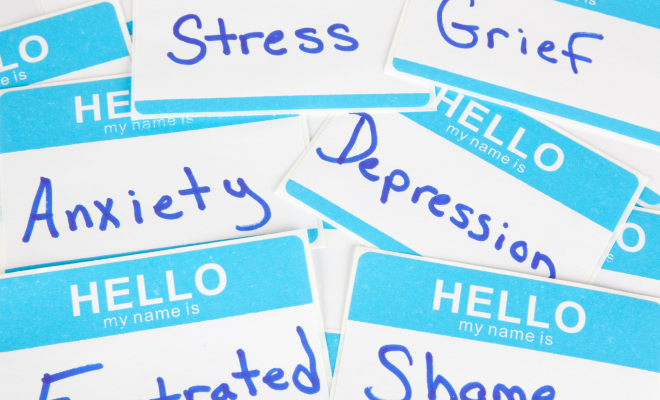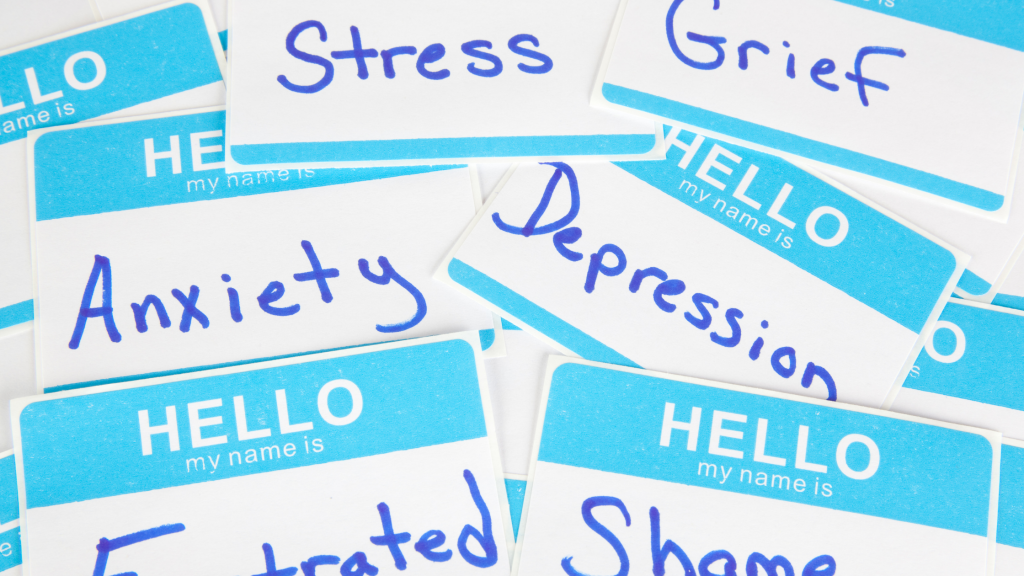Top Mental Health Challenges that Millennials & Gen Z Face Today

You would think that as the most digitally connected and informed, Millennials and Gen Zers would be the most upfront about their mental health and wellbeing. According to the Deloitte Global 2021 Millennial and Gen Z Survey, both generations report high stress and anxiety levels – and remain hesitant about expressing their stress and anxiety to their peers or employers. Gen Z is poised to be the most stressed, anxious and depressed (the most isolated) generation of all time. The top 3 mental health issues reported by both generations are anxiety, depression, and eating disorders.

There is still a stigma about mental health, and the only way we can get rid of it is by educating ourselves. Here is how we can help identify the different mental health issues (please seek professional advice, especially if you are experiencing any of the following, below):
Anxiety
Anxiety is the leading mental health condition today. How do we know if it is an anxiety disorder or a feeling of anxiousness? How do we differentiate between the two? According to Heretohelp.com, normal anxiety lasts as long as the situation or problem, while anxiety disorder might not be related to any specific situation.
Anxiety
- Related to a specific situation or problem
- Lasts only as long as the situation or problem
- Proportional to the situation or problem
- Seemingly realistic response to a realistic problem
Anxiety Disorder
- Anxiety may come up unexpectedly, and might not be related to a specific situation
- The anxiety response to a situation or problem may be much stronger than they expect
- They may experience a lot of unrealistic anxiety, such as fear of an unlikely situation
- Anxiety may last for a long time, even when the situation or problem has been resolved
- Anxiety may feel impossible to control or manage
- They may avoid situations or things that they believe will trigger their anxiety symptoms
Below are some of the most common types of anxiety disorders:
Generalized Anxiety Disorder (GAD): Involves constant, severe anxiety that interferes with day-to-day activities.
Obsessive-Compulsive Disorder (OCD): Experience intrusive and unreasonable thoughts, fears, and obsessions that lead to repetitive behaviors and compulsions.
Panic Disorder: Characterized by constant fearfulness and frequent, sudden attacks of terror and panic.
Post-Traumatic Stress Disorder (PTSD): PTSD usually develops after someone experiences or witnesses a traumatic event. It is also possible for individuals to experience trauma without suffering a major catastrophic event.
Social Anxiety Disorder: This mental health condition manifests as irrational anxiety, fear, self-consciousness, and embarrassment in everyday social interactions.
Depression
We have felt sadness to some degree, but do we know if our emotional state is one that might require seeking medical or professional help?
What is the difference between situational depression and clinical depression?
Situational depression is a short-term form of depression, an emotional state that occurs after a person experiences a traumatic event or change in their life. It usually occurs within 90 days (about 3 months) after the event. It is considered an adjustment disorder while clinical depression is considered a mood disorder. If recovery from situational disorder does not occur within a few weeks, then clinical depression may develop.
Symptoms can include:
- Sadness, tearfulness
- Feeling nervous, tired, or hopeless
- Physical symptoms such as headaches, stomachaches, or heart palpitations
- Behavioral signs such as arguing and fighting more or skipping school/work
- Changes in sleeping or eating habits
- Using alcohol or drugs
No type of depression is more “real” than the other.
According to the America Psychiatric Association, depression (major depressive disorder) is a common and serious medical illness that negatively affects how you feel, the way you think and how you act. Symptoms must last at least two weeks and must represent a change in your previous level of functioning for a diagnosis of depression.
Depression symptoms can vary from mild to severe and can include:
- Persistent sadness, emptiness, or depressed mood
- Loss of interest or pleasure in hobbies and activities
- Feelings of hopelessness or pessimism
- Feelings of guilt, worthlessness, helplessness
- Decreased energy, fatigue, being “slowed-down”
- Difficulty concentrating, remembering, making decisions
- Insomnia or oversleeping/trouble waking up in morning
- Appetite and/or weight changes
- Restlessness, irritability, anxiety
- Persistent physical symptoms such as headaches, stomachaches, or heart palpitations
- Thoughts of death or suicide, suicide attempts
Also, medical conditions (e.g., thyroid problems, a brain tumour or vitamin deficiency) can imitate symptoms of depression so it is important to rule out other causes with a medical exam.
Eating Disorder
Eating disorders affect people of all backgrounds; genders, ages, races, religions, ethnicities, sexual orientations, body shapes, and weights.
There are different ways to identify eating disorders – emotional and behavioural and physical symptoms. While there are different types of eating disorders, here are some common symptoms to look out for:
Emotional & Behavioural
- In general, behaviors and attitudes that indicate that weight loss, dieting, and control of food are becoming primary concerns
- Preoccupation with weight, food, calories, carbohydrates, fat grams, and dieting
- Refusal to eat certain foods, progressing to restrictions against whole categories of food (e.g., no carbohydrates, etc.)
- Appears uncomfortable eating around others
- Food rituals (e.g. eats only a particular food or food group [e.g. condiments], excessive chewing, doesn’t allow foods to touch)
- Skipping meals or taking small portions of food at regular meals
- Any new practices with food or fad diets, including cutting out entire food groups (no sugar, no carbs, no dairy, vegetarianism/veganism)
- Withdrawal from usual friends and activities
- Frequent dieting
- Extreme concern with body size and shape
- Frequent checking in the mirror for perceived flaws in appearance
- Extreme mood swings
Physical
- Noticeable fluctuations in weight, both up and down
- Stomach cramps, other non-specific gastrointestinal complaints (constipation, acid reflux, etc.)
- Menstrual irregularities — missing periods or only having a period while on hormonal contraceptives (this is not considered a “true” period)
- Difficulties concentrating
- Abnormal laboratory findings (anemia, low thyroid and hormone levels, low potassium, low white and red blood cell counts)
- Dizziness, especially upon standing
- Fainting/syncope
- Feeling cold all the time
- Sleep problems
- Cuts and calluses across the top of finger joints (a result of inducing vomiting)
- Dental problems, such as enamel erosion, cavities, and tooth sensitivity
- Dry skin and hair, and brittle nails
- Swelling around area of salivary glands
- Fine hair on body (lanugo)
- Cavities, or discoloration of teeth, from vomiting
- Muscle weakness
- Yellow skin (in context of eating large amounts of carrots)
- Cold, mottled hands and feet or swelling of feet
- Poor wound healing
- Impaired immune functioning
It is important to be aware of and understand how we are feeling emotionally, mentally, and physically. As people, it is crucial that we have our own circles or communities that we can rely on – which is why it is important to also look out for our family and peers – extend a hand if they might be in need as it can make all the difference.
Click here if you are interested in learning and understanding more about mental health and psychology.
Sources:
https://psychiatry.org/patients-families/depression/what-is-depression
https://www.medicalnewstoday.com/articles/314698#diagnosis
https://www.nationaleatingdisorders.org/warning-signs-and-symptoms
https://www.nationaleatingdisorders.org/warning-signs-and-symptoms










